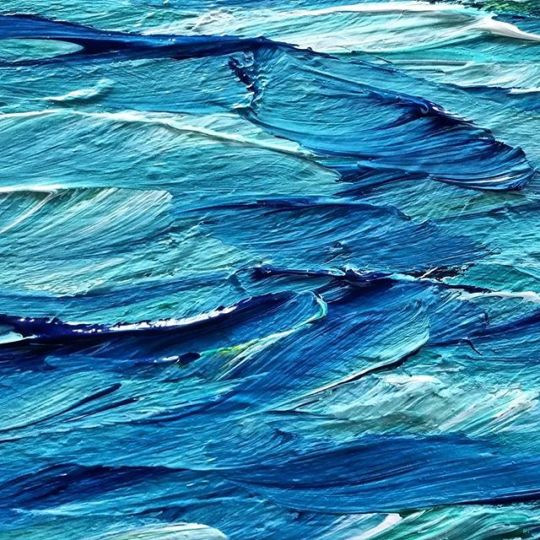Things should be kept as simple as possible but not simpler.
Don't wanna be here? Send us removal request.
Photo



Super Mario x Vogue
prints available on thatsiconic(dot)com
18K notes
·
View notes
Text

The F-14 Tomcat was the US Navy’s carrier-based two-seat air defence, intercept, strike and reconnaissance aircraft. The aircraft was developed by Northrop Grumman to replace the F-4 Phantom fighter and entered service with the US Navy in 1972. The US Navy operated 338 F-14 aircraft of all three variants, but the aircraft was replaced by the F/A-18E/F Super Hornet. In July 2006, the F-14 made its last carrier launch and, on 22 September 2006, the US Navy officially retired the F-14 Tomcat. The F-14 is currently in service with Iran Air Force.
192 notes
·
View notes
Photo

“… Mazda KODO bike concept / I share . . #KODO . . #aero_team #aerocycling #fixedgear #fixie #bicycle #cycling #cyclist #rider #bike…” instagram.com
441 notes
·
View notes
Photo

Seagulls, from earlier this year, taken with Portra 400 film and the Pentax K1000.
This is a river estuary on the east coast and it was freezing cold. It felt as if the wind was coming directly from Siberia.
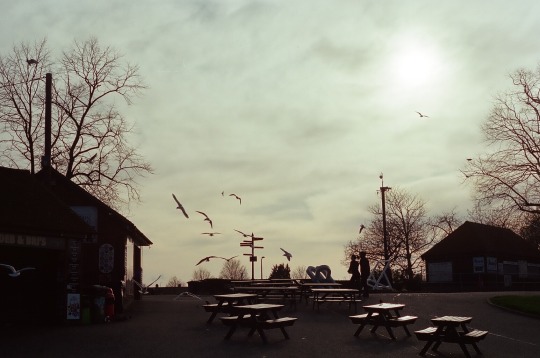
15 notes
·
View notes
Text
10 Amazing Space Discoveries by the World’s Largest Flying Observatory
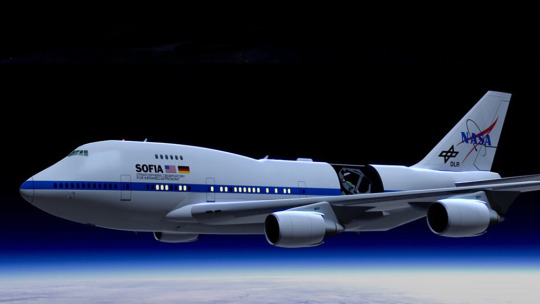
On the night of May 26, 2010, the Stratospheric Observatory for Infrared Astronomy, or SOFIA, the world’s largest flying observatory, first peered into the cosmos. Its mission: to study celestial objects and astronomical phenomena with infrared light. Many objects in space emit almost all their energy at infrared wavelengths. Often, they are invisible when observed in ordinary, visible light. Over the last decade, the aircraft’s 106-inch telescope has been used to study black holes, planets, galaxies, star-forming nebulas and more! The observations have led to major breakthroughs in astronomy, revolutionizing our understanding of the solar system and beyond. To celebrate its 10 years of exploration, here’s a look at the top 10 discoveries made by our telescope on a plane:
The Universe’s First Type of Molecule
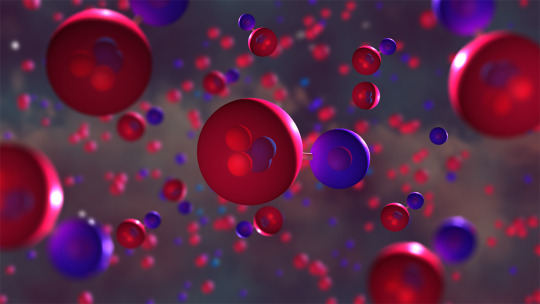
Scientists believe that around 100,000 years after the big bang, helium and hydrogen combined to make a molecule called helium hydride. Its recent discovery confirms a key part of our basic understanding of the early universe.
A New View of the Milky Way
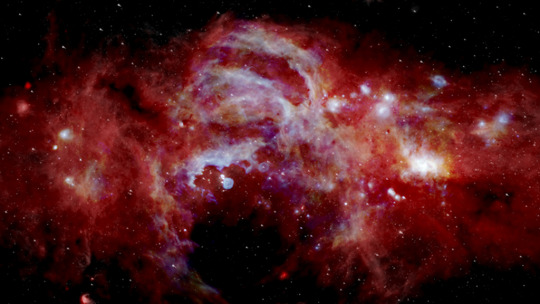
More than a pretty picture, this panorama of cosmic scale reveals details that can help explain how massive stars are born and what’s feeding our Milky Way galaxy’s supermassive black hole.
When Planets Collide
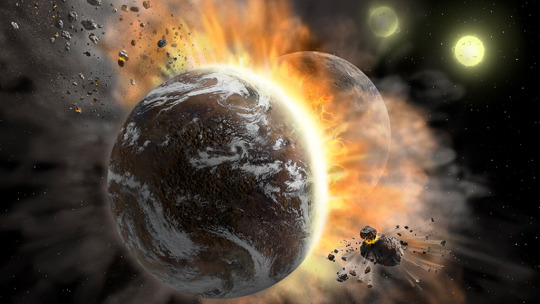
A double-star system that is more than 300 light-years away likely had an extreme collision between two of its rocky planets. A similar event in our own solar system may have formed our Moon.
How A Black Hole Feasts
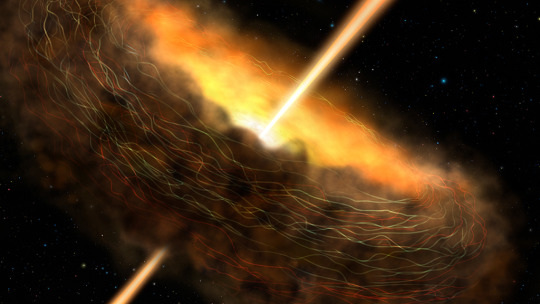
Fear not, the dark, my friend. And let the feast begin! Magnetic fields in the Cygnus A galaxy are trapping material where it is close enough to be devoured by a hungry black hole.
Somewhere Like Home
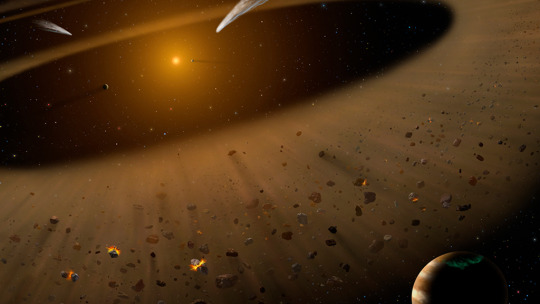
The planetary system around Epsilon Eridani, a star located about 10 light-years away, has an architecture remarkably similar to our solar system. What’s more, its central star is a younger, fainter version of our Sun.
A Quiet Place
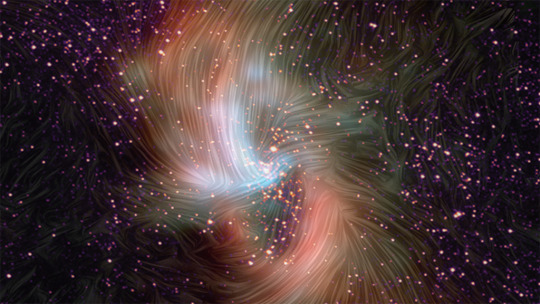
Black holes in many galaxies are actively consuming material, but our Milky Way galaxy’s central black hole is relatively quiet. Observations show magnetic fields may be directing material around, not into, the belly of the beast.
The Great Escape
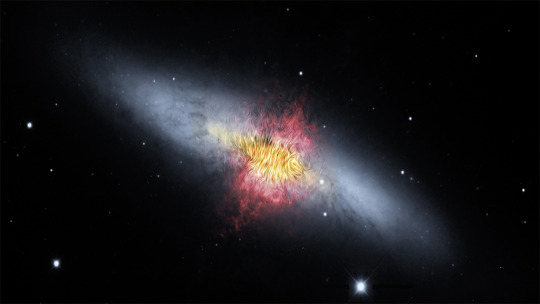
Ever wonder how material leaves a galaxy? The wind flowing from the center of the Cigar Galaxy is so strong it’s pulling a magnetic field — and the mass of 50 to 60 million Suns — with it.
Exploding Star, New Worlds
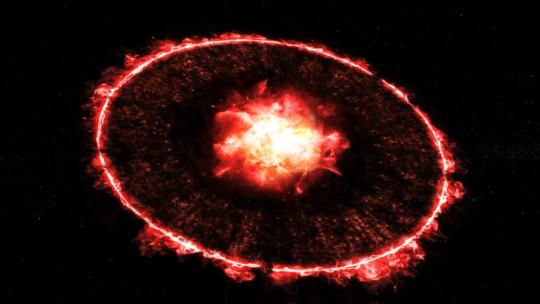
What happens when a star goes boom? It turns out that supernova explosions can produce a substantial amount of material from which planets like Earth can form.
Stellar Sibling Rivalry
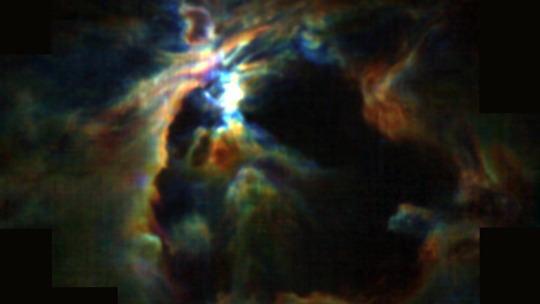
They say siblings need time and space to grow, but here’s one that really needs some room. A newborn star in the Orion Nebula is clearing a bubble of space around it, preventing any new luminous family members from forming nearby.
Clues to Life’s Building Blocks

Radiation from stars is making organic molecules in nebula NGC 7023, also known as the Iris Nebula, larger and more complex. The growth of these molecules is one of the steps that could lead to the emergence of life under the right circumstances.
SOFIA is a modified Boeing 747SP aircraft that allows astronomers to study the solar system and beyond in ways that are not possible with ground-based telescopes. Find out more about the mission at www.nasa.gov/SOFIA.
Make sure to follow us on Tumblr for your regular dose of space: http://nasa.tumblr.com
4K notes
·
View notes
Photo

2017 Porsche 911 Targa 4S Exclusive Design Edition
via reddit
199 notes
·
View notes
Photo

Street Night #mongkok #hongkong #discoverhongkong #nightphotography #streetphotography #theimaged #香港 (Kowloon, Hong Kong) https://www.instagram.com/p/B_Kd7m9pu0z/?igshid=ixagqihtj5qc
136 notes
·
View notes
























